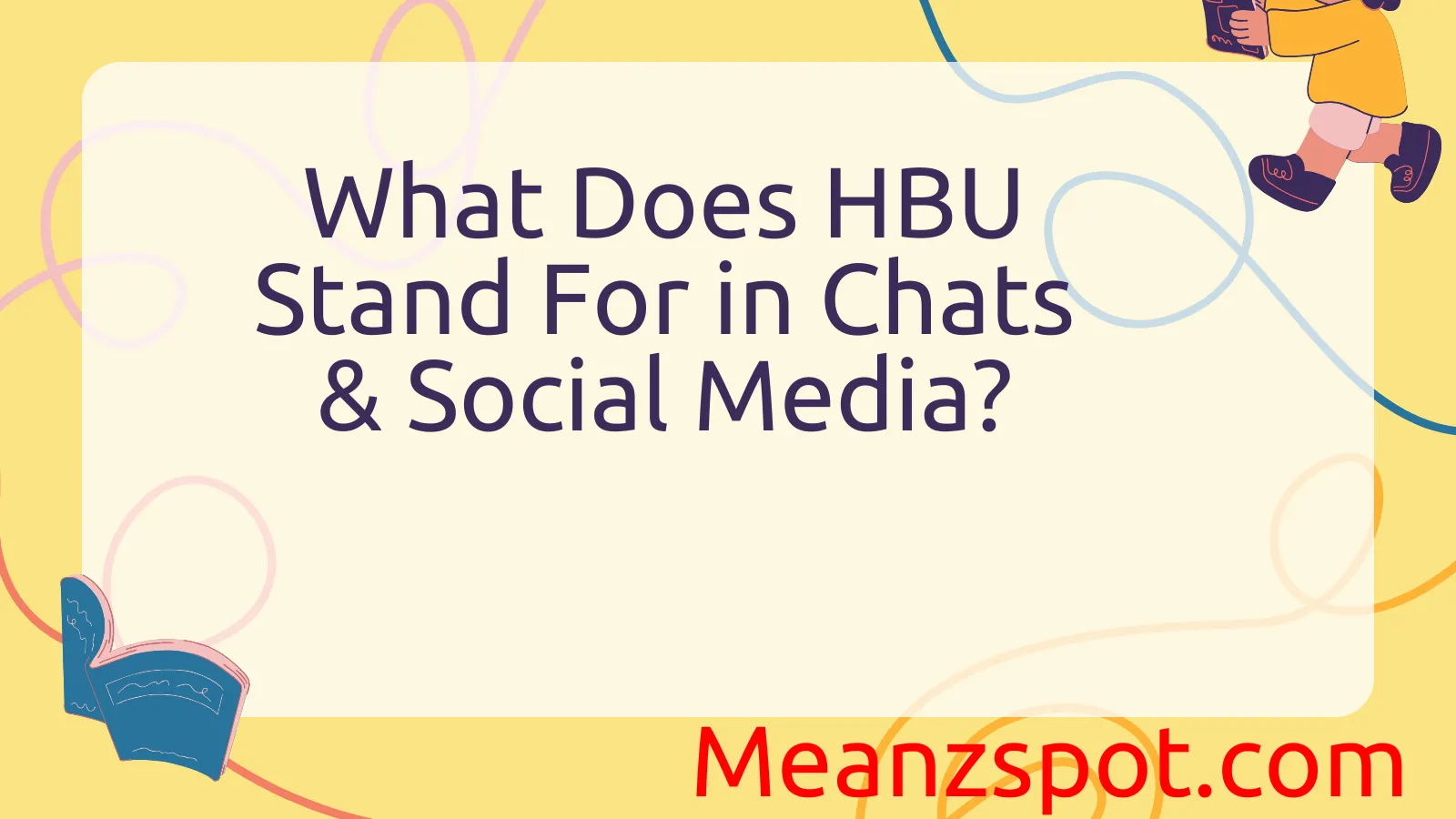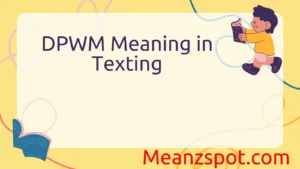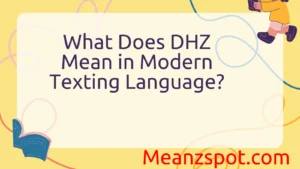If you spend time texting, scrolling through Snapchat, TikTok, or Instagram, you’ve probably come across the term HBU. This shorthand might look confusing at first, but it’s one of the most popular and trending acronyms in 2025 digital slang.
HBU simply stands for “How About You?” and it’s used when someone wants to keep a conversation going, show interest, or casually flip the question back. From casual chats with friends to quick replies in comment sections, HBU makes texting faster and smoother while keeping things personal.
But here’s the catch—its meaning can shift depending on tone, context, and who you’re chatting with. In this updated guide, we’ll break down real-life examples, social media usage, and modern texting tips so you’ll never feel left out of the conversation.
Definitions & Meaning
HBU stands for “How About You?” It is commonly used in casual text messages, chats, and social media to ask the other person for their opinion, status, or experience in response to something previously stated.
For example:
- Person A: “I’m just chilling today. HBU?”
- Person B: “Same here, taking it easy.”
In this context, “HBU” functions as a conversational mirror, turning the question or statement back to the other person. It helps maintain a two-way interaction, encouraging further dialogue. It is particularly useful when the speaker wants to continue the topic or show interest in the other person’s response.
“HBU” is part of a broader category of acronyms designed to make digital communication faster and more fluid. Like “LOL” (laugh out loud) or “BRB” (be right back), it’s a shorthand that conveys meaning in fewer characters.
Despite its casual tone, “HBU” is widely accepted in informal communication. However, it may not be suitable for formal or professional settings, where full sentences or proper grammar are expected.
Origins & History
The use of acronyms in digital communication dates back to the early days of the internet and mobile texting, particularly during the 1990s and early 2000s. With character limits on early SMS (Short Message Service) and chat platforms like AOL Instant Messenger (AIM), users began to shorten commonly used phrases. This gave birth to a wide range of abbreviations, including “HBU.”
“HBU” likely emerged as a convenient, phonetic shortening of the question “How about you?” As texting grew in popularity, especially among younger users, speed and efficiency became important factors. Typing “How about you?” every time was not only time-consuming but also unnecessary when both parties understood the context.
Over time, “HBU” gained traction on various platforms—first in SMS, then in online chatrooms, forums, and eventually on social media networks like Facebook, Twitter, and Instagram. Its simplicity and utility contributed to its staying power.
Today, “HBU” remains a staple in digital communication, particularly in informal exchanges. Its use spans across age groups, though it remains most popular among teens and young adults.
Usage in Different Contexts
The versatility of “HBU” allows it to be used across various digital platforms and communication styles. Below are several common contexts where “HBU” appears:
1. Social Media:
In comment sections or direct messages, users often use “HBU” to ask for reciprocal input. For instance:
- “I loved the new Marvel movie. HBU?”
This is a casual and friendly way to keep the conversation going.
2. Text Messaging:
Texting is perhaps the most common platform for “HBU.” It’s used in casual, everyday conversations:
- “I’m grabbing lunch now. HBU?”
- “Not much happening here, hbu?”
3. Online Dating Apps:
“HBU” is frequently used in dating app conversations to reciprocate interest or learn more about someone:
- “I’m into hiking and cooking. HBU?”
It keeps the interaction light and engaging without overwhelming the other person.
4. Pop Culture and Memes:
Occasionally, “HBU” is used in memes or humorous contexts to satirize modern communication styles:
- A meme might show someone saying, “I just told my entire life story and all they said was ‘HBU?’”
5. Informal Work Chats (Rarely):
While it’s not common in formal communication, some relaxed work environments may see “HBU” in team chats like Slack:
- “Just wrapped up my part of the project. HBU?”
Still, full expressions are usually more appropriate in professional contexts.
Common Misunderstandings & Clarifications
Despite its simplicity, “HBU” can sometimes cause confusion, especially for those unfamiliar with texting slang. Here are a few common misunderstandings:
1. Misinterpreting the Acronym:
New users might think “HBU” stands for something more complex or unrelated. Some mistakenly interpret it as a reference to an institution (e.g., Houston Baptist University), depending on context.
2. Misreading the Tone:
Because “HBU” is short and to the point, it can sometimes seem blunt or dismissive if used without context or warmth. For example:
- “I’m sad today. HBU?” might seem too brief unless followed by a supportive response.
3. Confusing it with Similar Acronyms:
“HBU” can be confused with “WBU” (“What About You?”). While similar in meaning, “HBU” is typically more conversational, whereas “WBU” may be used when contrasting opinions:
- “I like vanilla. WBU?” (asking for a different preference)
- “I’m doing fine. HBU?” (asking about one’s current state)
Understanding the context in which “HBU” is used can eliminate much of this confusion.
Alternatives & Synonyms
While “HBU” is popular, several alternatives can serve the same function, with slight variations in tone or formality:
1. “WBU” – What About You?
Virtually identical in purpose, but may come across slightly more inquisitive or comparison-focused.
2. “And You?”
A more traditional way to reciprocate a question. Suitable in both informal and formal settings.
3. “How Are You?”
Used as a direct inquiry about someone’s well-being, often at the beginning of a conversation.
4. “Same Question for You”
Slightly more formal and often used in professional or interview scenarios.
5. “Your Turn”
Casual and fun, especially in contexts like games or Q&A settings.
Each alternative offers a different tone, and choosing the right one depends on your audience and the platform.
Frequently Asked Questions (FAQ)
1. What does HBU mean in text?
HBU stands for “How About You?” and is used to ask for a reciprocal response in casual digital communication.
2. Is HBU appropriate for professional use?
Generally, no. While it may be acceptable in very casual work environments, full phrases like “How about you?” are preferable in professional settings.
3. What’s the difference between HBU and WBU?
Both mean essentially the same thing, but “WBU” emphasizes contrast (“what about you?”) while “HBU” is more conversational (“how about you?”).
4. When should I use HBU?
Use HBU in informal texts, chats, or social media when you want to keep a conversation going or show interest in the other person’s response.
5. Can HBU be used at the beginning of a conversation?
It’s usually used in response to a statement or question. Starting with HBU might confuse the reader unless it’s part of a structured conversation.
6. Is HBU used globally?
While it originated in English-speaking countries, HBU is now widely recognized due to the global nature of online communication.
7. Are there emojis often paired with HBU?
Sometimes people add a smiley 😊 or shrug 🤷 to soften the tone and make it feel friendlier.
Conclusion
Understanding abbreviations like “HBU” is essential in navigating the landscape of modern digital communication. It stands for “How About You?” and is widely used in texting and social media to keep conversations balanced and interactive. Its origins lie in the early days of SMS, and it continues to be relevant due to its simplicity and utility. Although informal, “HBU” has carved a niche in everyday conversation and is a staple in online interactions among friends, acquaintances, and even in casual dating.
However, it’s important to use “HBU” appropriately, recognizing the context and audience. With this knowledge, you’re better equipped to understand and participate in modern digital conversations, avoiding confusion and fostering clearer, more engaging interactions.



